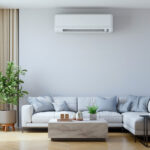
Does Air Conditioning Dry the Air?
The most common problem people experience in the summer when it comes to humidity is that it’s too high. However, in some climates, you might find that your household falls in the opposite category and is actually too dry.
The climate in Arizona is one of the driest in the country and during the summer, AC use makes humidity fall even lower. Although dry air feels cooler, when humidity levels drop below 30 percent, it can be harmful both to your family and house. If you suspect that your indoor air is too dry, you might benefit greatly from the use of a humidifier. From this article, you will learn why AC makes air too dry and what to do about it.
How to Tell if the Air in Your House is Too Dry?
Your air conditioner is designed to cool the air in your home, not dehumidify it. However, your air conditioner removes some moisture from the air in your home as it cools it. Depending on the initial humidity level and the intensity of the air conditioner’s operation, it may dehumidify the air in your home excessively. Arizona residents will find that this can be a real issue for them, as the climate is already arid to begin with.
You can tell if the air in your house is too dry by observing several indicators:
- Physical symptoms. Dry air can cause physical discomfort such as dry skin, chapped lips, irritated throat, and dry nasal passages. If you or your family members experience these symptoms frequently indoors, it might be a sign of low humidity.
- Static electricity. If you notice an increase in static electricity, such as getting shocked when touching metal objects or experiencing static clinging with clothing, it could indicate dry air.
- Defects in wooden furniture and flooring. Low humidity can cause wooden furniture and flooring to shrink or crack over time.
- Respiratory issues. Dry air can aggravate respiratory problems such as asthma. If you or your family members are experiencing increased respiratory discomfort or symptoms indoors, it may be due to AC making the air too dry.
- Hygrometer readings. Using a hygrometer, which measures humidity levels, can provide a precise indication of the humidity in your home. Generally, indoor humidity levels should be between 30% and 50%. If the humidity levels consistently fall below this range, the air in your house is too dry.
If you suspect that the air in your house is too dry, you can take steps to increase humidity, such as using a humidifier, placing bowls of water near heating sources, or incorporating houseplants that naturally increase humidity levels.
How is Your AC Drying the Air?
Air conditioners remove humidity, which is also referred to as water vapor, from the air. It’s a natural occurrence when cooling the air. When the air hits the cold evaporator coil inside the air handler, the air conditioner makes the humidity condense on the oil and drain into the pipe that exits outdoors. There is nothing you can do to prevent this condensation except to turn the AC off or turn the temperature up. Heating your home during winter has a similar effect. Your furnace dries the air by heating it.
Warmer air holds more humidity, and unless you add it to your home by bathing and cooking, or with a humidifier, the humidity level will continue to drop as long as you run your furnace or AC.
How to Prevent Dry Air From AC?
Here’s a detailed guide on how to increase humidity levels in your home:
- Use a humidifier. One of the most effective ways to increase humidity indoors is by using a humidifier. These devices add moisture to the air by releasing water vapor. There are different types of humidifiers available, including cool mist, warm mist, and ultrasonic humidifiers. Choose one that suits your preferences and the size of the room you want to humidify. Be sure to clean your humidifier regularly to prevent the buildup of mold and bacteria.
- Place bowls of water. Placing bowls of water near heat sources such as radiators or vents can help increase humidity levels. By evaporating, water adds moisture to the air. You can also place containers of water on top of or near heating units to achieve a similar effect.
- Take advantage of Steam. Steam from activities like cooking and showering can increase humidity levels in your home. Keep bathroom and kitchen doors open while showering or cooking to allow steam to spread throughout the house. Additionally, using a stovetop kettle to boil water can release steam into the air.
- Hang laundry to dry. Instead of using a dryer, hang your laundry to dry indoors. As the water evaporates from the wet clothes, it will increase the humidity levels in the room. This method is particularly useful during the winter months when using a dryer can contribute to dry indoor air.
- Add houseplants. Certain houseplants can naturally increase humidity levels through a process called transpiration, where water evaporates from the leaves. Plants such as peace lilies, Boston ferns, spider plants, and palms are known for adding moisture to the air. Grouping several plants can create a microclimate of higher humidity.
- Use a damp cloth or sponge. Wiping down surfaces with a damp cloth or sponge can help add moisture to the air as the water evaporates. Pay attention to frequently used surfaces like countertops and tables.
- Avoid overheating. Lowering the thermostat and avoiding overheating your home can help maintain higher humidity levels. Heating systems can dry out the air, so keeping temperatures moderate can prevent excessive drying.
- Seal leaks and cracks. Inspect your home for leaks and cracks around windows, doors, and walls. Sealing these gaps can help prevent the escape of humid air and maintain higher humidity levels indoors.

By incorporating these strategies, you can effectively increase humidity levels in your home, creating a more comfortable and healthier living environment, especially during dry seasons or in regions with naturally low humidity.
How to Stop an Air Conditioner from Drying Air?
To prevent your air conditioner from drying out the air excessively, you can implement the following measures:
- Adjust the thermostat. Set your air conditioner to a moderate temperature rather than the lowest setting. Higher temperatures can help prevent the air conditioner from cooling the air excessively, which reduces its ability to hold moisture.
- Utilize the “Fan Only” mode. Many air conditioners have a “fan only” mode that circulates air without actively cooling it. Using this mode intermittently can help maintain airflow without continuously running the air conditioning compressor, which can contribute to drying out the air.
- Regular maintenance. Ensure your air conditioner is well-maintained, including regular cleaning and replacing of filters. Dirty filters can restrict airflow and reduce the effectiveness of the air conditioner, potentially leading to drier air.
- Close windows and doors. While your air conditioner is running, keep windows and doors closed to prevent the exchange of indoor and outdoor air. This helps maintain the humidity level you desire indoors without introducing dry outdoor air.
- Use energy-efficient settings. If your air conditioner has energy-saving or humidity control settings, utilize them to optimize comfort while minimizing energy consumption and excessive drying of the air.
- Consider upgrading. If your current air conditioning system consistently dries out the air excessively despite your efforts, consider upgrading to a system with advanced humidity control features. Newer models often have improved technology designed to maintain comfortable humidity levels.
Understanding why AC dries the air and what to do about it will allow you to create the right temperature regime and humidity level in the room, which will favorably affect the health and condition of people.
McMillin Air repairs, services, and sells quality air conditioners in Arizona. Call us at 623-432-5202.








0 comments